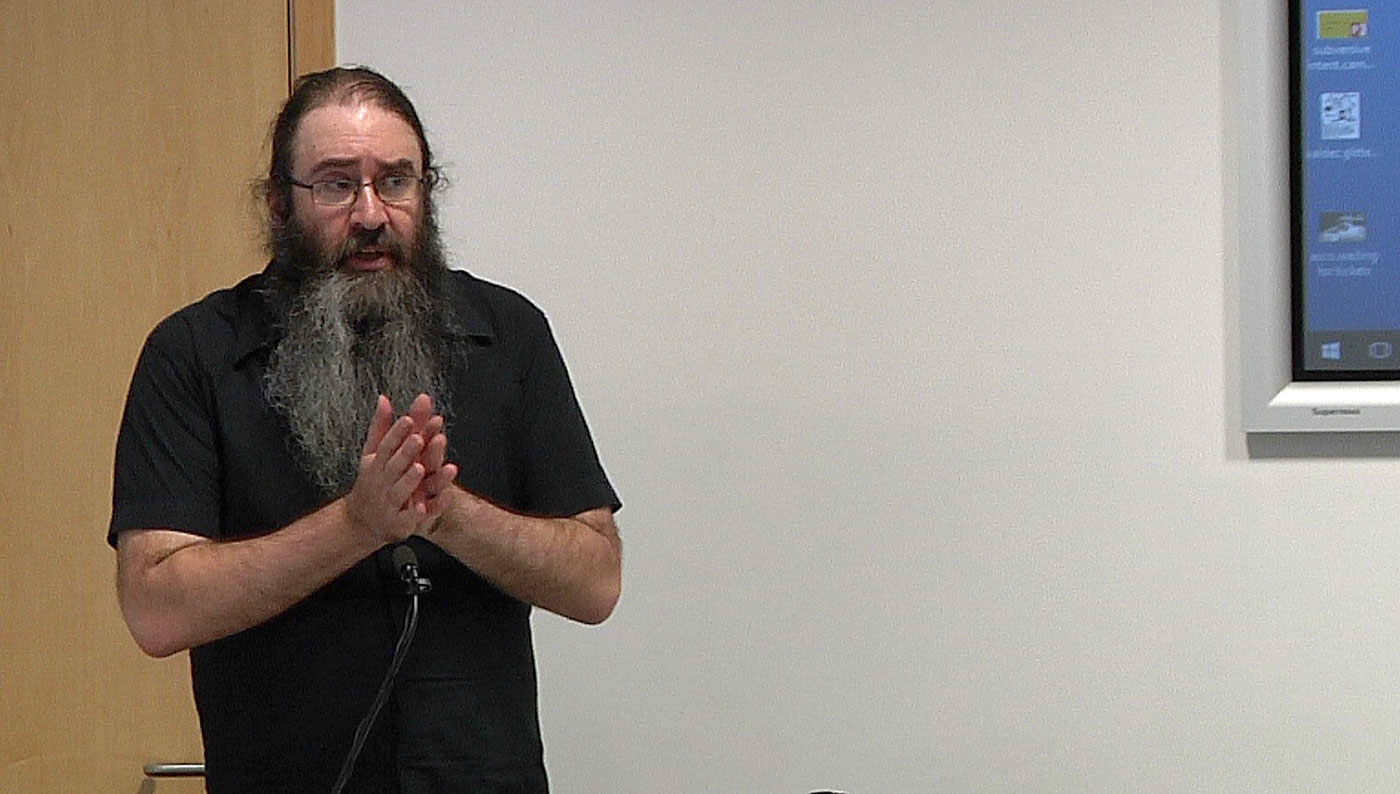Dr Keith Kahn-Harris - 5 June 2018 - Denialism, Post-Denialism and the Boundaries of the Speakable
Duration: 1 hour 34 mins
Share this media item:
Embed this media item:
Embed this media item:
About this item

| Description: |
Speaker: Dr Keith Kahn-Harris - Sociologist and writer
The term 'denialism' has come to be applied to a cluster of 'alternative' forms of knowledge, including Holocaust denial, global warming denial, anti-vaxxers, 911 conspiracism, creationism and more. In my forthcoming book Denial: The Unspeakable Truth, I argue that denialism arose in modernity as a result of a process in which, post-enlightenment, certain desires and political projects were rendered 'unspeakable' and impossible to legitimate publicly. Denialism is therefore a covert forms of advocating for and legitimating certain courses of action and ways of being in the world. The 'alternative' to denialism is , therefore, a dystopian prospect; a world in which the unspeakable becomes speakable again. This alternative is more than a hypothetical possibility. There are signs of a transition occurring from denialism to 'post-denialism'. Post-denialism, embodied in the discourse of Donald Trump, eschews the masquerade of science and scholarship that defines denialism, in favour of a visceral kind of quasi-acknowledgement of that which is denied. This may signal a weakening of the boundaries of the speakable and a concomitant shift in the language of political possibility. Dr Keith Kahn-Harris is a sociologist and writer. He is a senior lecturer at Leo Baeck College an associate lecturer at Birkbeck College, and a Fellow of the Institute for Jewish Policy Research. The talk will be followed by a drinks reception in the Alison Richard Building foyer. This event is being hosted by the Conspiracy & Democracy research project, a five-year project funded by The Leverhulme Trust and based at CRASSH. For further details about the event, please contact the project administrator, Rachael Taylor, here. |
|---|
| Created: | 2018-06-11 09:46 |
|---|---|
| Collection: | Conspiracy and Democracy |
| Publisher: | University of Cambridge |
| Copyright: | Glenn Jobson |
| Language: | eng (English) |
| Distribution: |
World
|
| Keywords: | Conspiracy and Democracy; Keith Kahn-Harris; CRASSH; |
| Explicit content: | No |
| Aspect Ratio: | 16:9 |
| Screencast: | No |
| Bumper: | UCS Default |
| Trailer: | UCS Default |
| Abstract: | Speaker: Dr Keith Kahn-Harris - Sociologist and writer
The term 'denialism' has come to be applied to a cluster of 'alternative' forms of knowledge, including Holocaust denial, global warming denial, anti-vaxxers, 911 conspiracism, creationism and more. In my forthcoming book Denial: The Unspeakable Truth, I argue that denialism arose in modernity as a result of a process in which, post-enlightenment, certain desires and political projects were rendered 'unspeakable' and impossible to legitimate publicly. Denialism is therefore a covert forms of advocating for and legitimating certain courses of action and ways of being in the world. The 'alternative' to denialism is , therefore, a dystopian prospect; a world in which the unspeakable becomes speakable again. This alternative is more than a hypothetical possibility. There are signs of a transition occurring from denialism to 'post-denialism'. Post-denialism, embodied in the discourse of Donald Trump, eschews the masquerade of science and scholarship that defines denialism, in favour of a visceral kind of quasi-acknowledgement of that which is denied. This may signal a weakening of the boundaries of the speakable and a concomitant shift in the language of political possibility. Dr Keith Kahn-Harris is a sociologist and writer. He is a senior lecturer at Leo Baeck College an associate lecturer at Birkbeck College, and a Fellow of the Institute for Jewish Policy Research. The talk will be followed by a drinks reception in the Alison Richard Building foyer. This event is being hosted by the Conspiracy & Democracy research project, a five-year project funded by The Leverhulme Trust and based at CRASSH. For further details about the event, please contact the project administrator, Rachael Taylor, here. |
|---|---|
Available Formats
| Format | Quality | Bitrate | Size | |||
|---|---|---|---|---|---|---|
| MPEG-4 Video | 1280x720 | 3.01 Mbits/sec | 2.07 GB | View | Download | |
| MPEG-4 Video | 640x360 | 1.94 Mbits/sec | 1.34 GB | View | Download | |
| WebM | 1280x720 | 2.59 Mbits/sec | 1.79 GB | View | Download | |
| iPod Video | 480x270 | 524.13 kbits/sec | 360.85 MB | View | Download | |
| MP3 | 44100 Hz | 251.75 kbits/sec | 173.33 MB | Listen | Download | |
| Auto * | (Allows browser to choose a format it supports) | |||||

